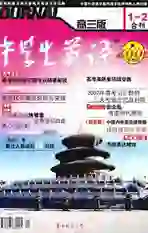字母词时代来临 汉语“纯度”受污染?
2008-03-26钱玉湘
钱玉湘
Does technology pose a threat to the purity of Chinese language?
Many Chinese use instant messenger tools such as MSN or QQ, listen to music on MP3 players and log on the Internet using ADSL—most without knowing the literal Chinese translation of the abbreviations.
But they dont have to, as many English letters have become part of the local lexicon.
A dozen abbreviations including GDP, NBA, IT, MP3, QQ, DVD and CEO are among the 5,000 most-frequently used words in the Chinese-language media last year, according to a report on the 2006 Language Situation in China, which was released yesterday in Beijing.
The report said some parents are so keen on English letters that a couple tried to name their baby “@”, claiming the character used in e-mail addresses reflects their love for the child.
While the “@” is obviously familiar to Chinese e-mail users, they often use the English word “at” to pronounce it—which with a drawn out “T” sounds something like ai ta, or “love him”, to Putonghua speakers.
The study collected more than 1 billion language samples from newspapers, magazines, TV, radio and websites. The annual report is jointly compiled by the Ministry of Education and the State Language Commission.
“Nowadays, more and more English abbreviations are being used in Chinese, making them an important part of the contemporary language,” said Hou Min, a professor at Communication University of China.
“The abbreviations have gained popularity because of the ease of usage,” Hou said.
For example, DNA is much simpler to use than its Chinese version tuoyang hetang hesuan.
“As more Chinese people learn foreign languages, especially English, in recent years, using abbreviations has become a trend among educated people,” she said.
Some language scholars fear such usage will contaminate the purity of Chinese and cause confusion in communication.
科技发展威胁到了汉语的“纯度”了吗?
很多中国人使用MSN或QQ等即时通信工具、用MP3听音乐、用ADSL上网,但大多数人都不知道这些英文缩写的中文翻译。
但他们也不必知道,因为很多字母词已成为汉语词汇中的一部分。
据昨天在北京公布的《中国语言生活状况报告(2006)》显示,去年,GDP、NBA、IT、MP3、QQ、DVD、和CEO等字母词进入中文媒体前5000个高频词之列。
报告中提到,一些家长也很喜欢英文字母词,一对夫妇想给他们的孩子起名为@,他们说,这个用在电子邮件地址中的符号能体现他们对孩子的爱。
用电子邮箱的人都很熟悉@这个符号,它的发音为英文单词at,拉长“T”的发音后听起来就像是ai ta,用普通话说就是“爱他”。
该年度报告是由教育部和国家语言文字工作委员会联合编撰的。该项调查从报纸、杂志、电视、广播和互联网上收集了10亿多份语言样本。
中国传媒大学的侯敏教授说:“如今,越来越多的英文缩写出现在中文中,它们已成为现代语言中的重要组成部分。”
侯教授说:“由于这些英文缩写易于使用,所以很受欢迎。”
比如,用DNA比用中文“脱氧核糖核酸”要简单得多。
她说:“近年来,越来越多的中国人学习外语,尤其是英语,使用英文缩写已成为受过良好教育的人的一种潮流。”
一些语言学者担心,这些字母词的使用会污染汉语的纯度,会导致沟通上的混乱。
